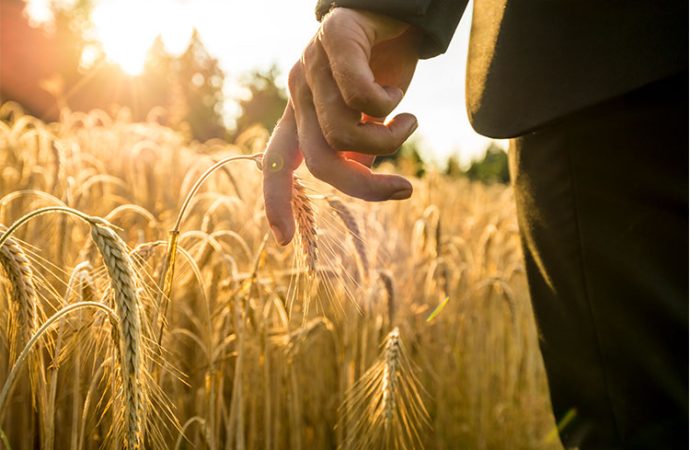Author Recent Posts Khalid Javed Latest posts by Khalid Javed (see all) Will General Elections bring Stability in Pakistan – February 13, 2024 Resilient Food Systems and sustainable agriculture, challenges in the implementation and way forward. – January 2, 2024 “Tale of Bleeding Palestinian Issue: Explainer” – November 21, 2023
In a world grappling with the challenges of a burgeoning population, escalating climate concerns, and the imperative for sustainable practices, the synergy between regenerative agriculture and resilient food systems emerges as a beacon of hope and transformative potential. Sustainable agriculture, working with nature, ensures the long-term sustainability of food resources while minimizing environmental impact. It protects natural resources, promotes economic profit and promotes social equality. Benefits include environmentally friendly practices, economic opportunities for farmers and a resilient food system. The implementation of sustainable agriculture includes renewable energy, organic farming and reducing the use of pesticides. Alternative food options, such as vegetarianism, are more environmentally friendly. Adopting sustainable practices is critical to a healthier and more resilient future in the face of growing population pressures. What are the challenges associated with achieving sustainable agriculture, given the widespread use of synthetic chemicals, environmental pollution, lack of investment and modern technology, and negative impacts of climate change in soil ecosystems?
Amid urbanization and climate concerns, the urgent call for sustainable and resilient city food systems (CRFS) is clear. Growing cities face challenges such as poverty and climate change that necessitate the production, distribution and consumption of food. CRFS provides a comprehensive solution by linking urban and rural areas, ensuring local and nutritious food, strengthening livelihoods, reducing waste and promoting environmental sustainability. The delicate balance between urbanization and resource demands highlights the importance of integrated CRFS approaches. By emphasizing balanced urban-rural linkages, the CRFS adapts to specific urban-regional dynamics.
A resilient CRFS goes beyond immediate food concerns and contributes to broader societal well-being. They promote participatory governance involve different stakeholders and foster shared responsibility. Political will and effective policy tools are essential to navigate complex urban issues, and the toolkit presented serves as a global guide. The need for a sustainable CRFS is unquestionable – it’s about feeding communities, supporting local economies and protecting the environment. Given the challenges of modernization, adopting CRFS is not just a choice. This is a strategic necessity for a healthy and sustainable urban future.
The synergy between sustainable agriculture and resilient food systems lies in understanding and addressing the root causes of threats such as drought. The 30% increase in global drought since 2000 is not only attributable to decreased precipitation but also to decreased soil organic matter (SOM). SOM recovery, achieved through practices such as cover cropping, tillage, and improved irrigation, plays a key role in increasing soil water conservation.
Cover cultivation, in which different types of plants are combined with thin crops, appears as a powerful strategy that significantly increases soil moisture levels and increases the rate of rainwater infiltration. This approach, adopted by a large global agricultural community, serves as a countermeasure to land degradation caused by conventional industrial agriculture, which is known for deforestation and freshwater depletion. The positive results go beyond environmental considerations and actively contribute to reducing the escalating hunger crisis.
The emphasis on sustainable land management resonates globally, as evidenced by initiatives such as Africa’s Green Wall and Vietnam’s agroforestry practices. This collective effort envisions a future in which land reclamation, with political will, transforms food systems by achieving higher productivity with less land, increasing GDP and strengthening drought resistance. At the heart of this transformation are government policies and investments that encourage sustainable land management, providing multifaceted benefits, including food security, job creation and environmental conservation.
Sustainable agriculture provides a multifaceted solution that achieves a balance between environmental protection, economic stability and social justice. Using environmentally friendly practices such as crop rotation and intercropping conserves natural resources and enhances soil health and water quality. Economically, it empowers local economies and small farmers, proving its ability to survive financially with fewer inputs. Socially, it promotes a more equitable food system, ensuring sustainable access to affordable food. Increased food security and sustainable practices create a resilient and efficient global food system, mitigating the effects of climate change. Implementation includes using renewable energy, encouraging organic agriculture and reducing the use of pesticides. Complementing this, alternative food options such as veganism and urban farming contribute to sustainability, offering healthier and cheaper alternatives. As a vital step towards a healthier future, sustainable agriculture protects resources, mitigates the effects of climate change and promotes overall environmental well-being, emphasizing the importance of collective efforts for a better world.
- Will General Elections bring Stability in Pakistan - February 13, 2024
- Resilient Food Systems and sustainable agriculture, challenges in the implementation and way forward. - January 2, 2024
- “Tale of Bleeding Palestinian Issue: Explainer” - November 21, 2023












Leave a Comment
Your email address will not be published. Required fields are marked with *